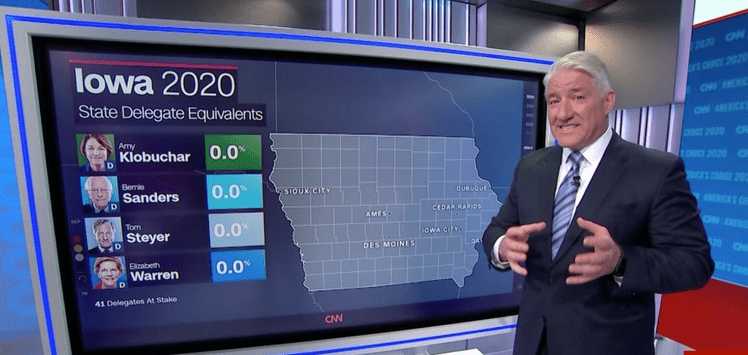Shark Week for KAOS: Trump, Iowa and the State of Democracy
The 2020 US presidential campaign is already giving the relentless dumpster fire of 2016 a run for its lunacy.
Lisa Van Dusen/For The Hill Times
January 5, 2020
By the time you read this, the sh*tshow that happened in Iowa Monday night may have been overtaken by the sh*tshow of whatever an impeached Donald Trump did in the House of Representatives Tuesday night to verbally misrepresent the state of the union while personally embodying its ongoing swerve into political chaos.
For the interests who’ve been undermining democracy worldwide, it’s already Shark Week, and it’s only Wednesday.
While this column is being filed without the Iowa results it was meant to lead with and officials have just attributed that delay to a faulty app, the delay certainly won’t help the perception that the caucuses were, shall we say, problematic. That the drama is unfolding next to the split-screen of Donald Trump’s corrupt, performative presidency awaiting a shot of reanimating adrenaline by Senate Republicans makes it sadly, thematically consistent.
The Scorcese-esque mood was set for Monday night’s undelivered Iowa results when the highly anticipated Des Moines Register poll, which quadrennially telegraphs the winner of the state’s caucuses, was pulled on the weekend based on a reported problem in the questioning process.
As the first occasion for American voters to cast the ballots that will begin to funnel the narrative of the looming presidential election toward an outcome, the first-on-the-calendar Iowa caucuses are always a wildly anticipated, demographically skewed political pageant. As a predictor of which candidate will win the presidency, the winner in the state’s Democratic caucuses has gone on to win the nomination in seven of 10 contested races since 1972, with Jimmy Carter in 1976 and Barack Obama in 2008 going on to win the presidency. In an uncertain race, the caucuses can provide early clarity, which makes them disproportionately important.
In 2016, the all-but-tied result between Hillary Clinton (49.84) and Bernie Sanders (49.59) was an early indicator of the weakness of Clinton’s second bid for the presidency. In 2008, Obama’s victory in Iowa revealed the strength of what conventional wisdom had deemed a longshot run and boosted the currency of his national electability in the key early primary state of South Carolina. In normal circumstances, Iowa is about expectations and stress-testing a campaign’s ground game. At a time when narrative warfare has contaminated politics to produce otherwise preposterous outcomes, the Iowa caucuses are also a major target for the sort of orchestrated chaos that undermines the democratic process.
In an age of shocking democratic outcomes that seem to betray a strange new proclivity on the part of humans to declare preferences against their own interests (especially if you consider the survival of democracy to be in the interest of voters, what one would think would be a no-brainer) from Brexit to the 2016 US presidential election to a range of bizarre opinion polling results, the Iowa poll and polling problems represent a shift from previously unthinkable results to actually unthinkable results.
In strategic terms, what at press time has been attributed to a coding error in Iowa’s new results-reporting app has enabled the Democratic party to be portrayed as incompetent and disorganized based on a self-inflicted disaster, which may be — shocking to hear in an era when the president of the United States has lied 16,000 times since taking an office he has been kept in despite that fact by flagrant corruption — predictive of the storyline to come. Which makes the party’s tension between its progressive and moderate wings and the debate over electability secondary to a much larger problem.
More important than the competing cases or the personalities is the neon marquee message out of Iowa: that there are problems with the architecture of democracy that have arisen since the process was digitized and made far more vulnerable. And that nothing else matters as much as fixing them.
Lisa Van Dusen is associate editor of Policy Magazine and a columnist for The Hill Times. She was Washington bureau chief for Sun Media, international writer for Peter Jennings at ABC News, and an editor at AP in New York and UPI in Washington.

